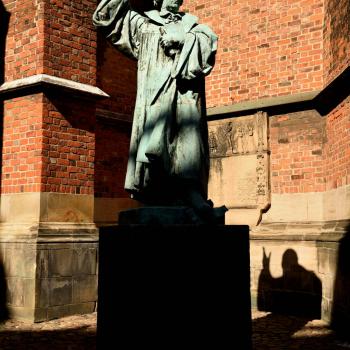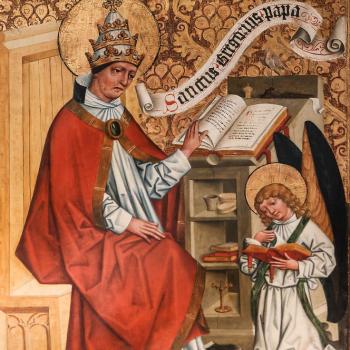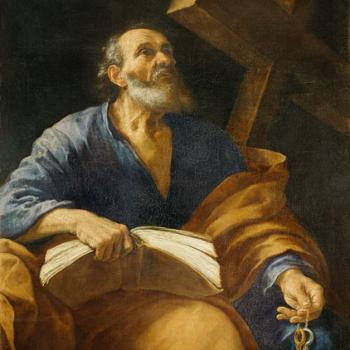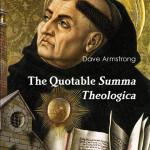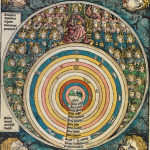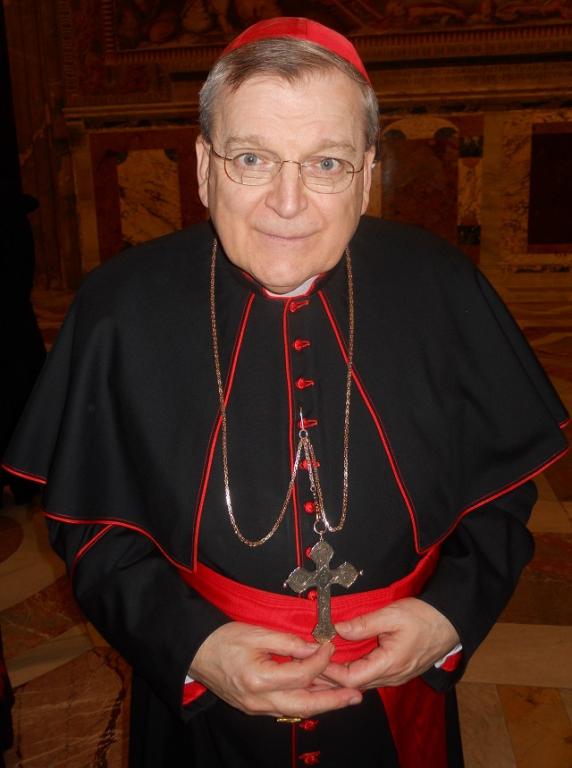
It seemed clear enough to me that he did, but in today’s “hyper-charged” atmosphere regarding anything papal, there must be controversy, and several of my friends have strongly disagreed. Karl Keating asked me: “just what is it you suspect Cardinal Burke to be saying? Be plainspoken about it. Don’t nod toward it without naming it.” I’m happy to oblige! As always, I try to have reasons for why I believe anything, and (being an author and professional apologist) to provide them in writing for others to mull over, and accept or reject. And I think lots of people would agree that I am “plainspoken” and open and transparent in my voluminous writings.
Here are the relevant excerpts (with my blue highlighting) of what Cardinal Burke said, in an interview with Aurelio Porfiri, published in O Clarim (12-21-17):
I would like to speak with you about Benedict XVI. At the time of his resignation, what did you feel?
It was an action that took me by surprise. It is clear that Pope Benedict has reached a certain age, but certainly he was in full possession of his faculties. Someone said that “he was not longer able to travel or bear many audiences.” But I ask myself: who says that the pope has to travel or that he has to receive so many people? I think it is necessary to re-examine the substance of the Petrine office. I would also say that it was not a good thing for the Church to lose its universal shepherd: there is a certain feeling among many Catholics that their father abandoned them. I hope it does not become a common practice.
Isn’t the pope’s traveling and seeing so many people something inherited from the times of John Paul II, and perhaps also Paul VI? Maybe these popes have introduced a new way of understanding the office of the Supreme Pontiff, which is not so essential?
Certainly Pope Paul VI began to travel a bit, just as he began to grant these interviews, for example the ones he gave to Jean Guitton, a French author. Pope John Paul II wanted to face the crisis of the Church with a new evangelization; that is why he traveled so often. But this not part of the Petrine ministry per se, whose mission is to safeguard the unity and the practice of the faith, and especially the liturgy.
Don’t you think that Benedict XVI, who saw the final years of John Paul II—we all remember him being very sick in his last years—feared to repeat these things?
It is naturally a fear. If I’m not mistaken, Pius XII was concerned about this matter. But it can happen to any pope, because a pope does not know how long he will have possession of his full faculties. But we must trust ourselves to our Lord and to the Church, which has the means to confront the situation of a pope who truly is no longer capable.
I have spoken with many journalists and personalities about Benedict XVI and I have discovered that even those most favorable to him have made the following observation, about which I’d like your comment: a great thinker, a great theologian, but not a great leader when it came to the government of the Church. What do you think?
He is certainly an extraordinary teacher of the faith. And he had a way of writing and speaking in a manner accessible to everyone. He also had a great charisma: he communicated a great paternity in individual encounters and also in groups. One thing we can say is that he did not want to be pope, not because he did not want to teach, because he was a great teacher even before he rose to the papal office, but in my opinion, from my limited point of view, the government of the Church, which isn’t easy for anyone, posed a tremendous challenge for him. So, he left it to others to attend to these things and there are some who did not serve him well.
Cardinal Burke appears (my take, anyway) to cite this notion of being “abandoned” as a legitimate thing: felt by “many Catholics.” But resigning due to health concerns and felt inability to do a very demanding and super-important job is hardly “abandoning.” If anything, Pope Benedict’s action was an example of the opposite. He felt that, given his health, someone else could do a better job. We’re talking about the pope’s self-report about his health and ability to continue an incredibly demanding job as a frail 86-year-old man. The “abandonment” charge is placing blame where there is none. Pope Benedict XVI felt that he resigned for the good of the Church. Accusing him of “abandoning” his flock simply because he felt ill-equipped health-wise is not fair or just. Does he bear blame simply for not feeling healthy enough to carry on the office?
The main question in dispute is whether Cardinal Burke agreed with the judgment of “abandoning” that he referenced. Several of my friends believe that he didn’t. I freely grant that the above interview offers no ironclad, indisputable proof one way or the other. But I’m saying that the strong implication is that he does agree: that it is plausible and natural to interpret his words, prima facie, in the way I have. Cardinal Burke raised the issue of abandonment, observing that “many” Catholics feel that way. Either he agrees with this notion, is neutral, or is opposed to it.
What he said was consistent with agreement, even though agreement is not absolutely certain from his words. It’s also consistent with neutrality. But to me it doesn’t seem consistent with disagreement, because he likely would have condemned the idea, if he disagreed, or else — it seems to me, as speculation — wouldn’t have brought up the “abandonment” issue in the first place, even when asked about the resignation.
There are other clues in the interview as well, as to his own position. He says, “it was not a good thing for the Church to lose its universal shepherd.” But that didn’t happen. The absence of a pope is the sedevacantist position. The Church was not without a pope, since a new one assumed office as soon as the procedure for succession could occur. Hence, Catholic canon lawyer, catechist and author Pete Vere stated on my page:
The point is Pope Benedict did not abandon the Church, or his flock. He entrusted them to whoever would follow as his successor. This idea that Benedict abandoned us plays into the narrative of the Francis critics that he really should not be pope. And as both a cardinal and the most senior churchman to publicly criticize Francis, Cardinal Burke ought to show more prudence in the eyes of many faithful.
When Cardinal Burke said, “we must trust ourselves to our Lord and to the Church, which has the means to confront the situation of a pope who truly is no longer capable,” he seemed again to suggest that Pope Benedict shouldn’t have resigned; that he should have left to the Church the decision as to whether he should remain in office. Yet a papal resignation is not contrary to canon law and has occurred in the past (four times). And the pope — as the Supreme Head of the Church — has the full prerogative (assuming mental competence and full use of faculties) to make such decisions on his own.
Many things are matters of longstanding custom, but it doesn’t follow that no exceptions can occur. Nor is a custom an absolute. For example, the popes were always Italian for hundreds of years (455 years to be exact, or since 1523). Then we got a Polish Pope, a German, and an Italian-Argentinian. That was “new” compared to “what had ‘always’ been.” But in actuality, there have been 59 non-Italian popes through history, or 21% of the whole (217 Italians have been popes).
I think this was good. One of three straight non-Italian popes was a saint, after all. The Church consists of many other nationalities besides Italian. Likewise, a papal resignation could be a good thing as well (and ought not automatically be assumed to be a bad thing). It’s not impermissible. It last happened 598 years before Benedict (in 1415). Yet Cardinal Burke and “many” others frown upon Benedict’s decision. Why, I ask?
Cardinal Burke (whether he agrees with the notion of “abandonment” or not) appears to think he shouldn’t have resigned; that it was somehow wrong and not trusting the Holy Spirit (even though canon law doesn’t forbid it).
The most extreme example I have found of criticism of Pope Benedict’s resignation came from journalist and video producer Michael Voris. In a video entitled, Benedict’s Footprints (10-25-15), Voris stated:
He resigned because of health reasons, but going on three years later, his health seems just fine. Contrast that with John Paul, who actually had a health issue . . .
In an era where fatherhood [has become] so disgraced, Pope Benedict is the one who will be remembered as abandoning his children in the hour of their need. [His resignation] may even rise to the level of immoral.
The Holy Father abandoned his flock, his children . . . [at 5:05 in the video]
He turned around and ran away, abandoning the flock to wolves he had led into the sheepfold. . . . [at 7:08]
Now, I have to make myself very clear. Of course, I’m not contending that Cardinal Burke’s views and those of Voris are identical. But I’m saying that the reference to Pope Benedict having “abandoned” his flock that Cardinal Burke alluded to includes (in the overall range of opinion; among other Catholics) this sort of rhetoric and thinking. The “many” includes the views of Michael Voris, who is by no means an unknown person in Catholic ranks. He influences multiple thousands of people.
Voris is not alone in his quite negative view. Dr. John Rao, one of the many reactionary signatories of the Correctio, directed towards Pope Francis (as I have documented) did a video interview with reactionary Michael Matt of The Remnant, a day after Pope Francis’ election. I wrote about it in my critique of the reactionaries who were prominent among the Correctio signatories:
He [Dr. Rao] says “It doesn’t look good” (1:00); that Pope Francis was elected by a faction who “don’t care if the Church dies” (1:15). How melodramatic! I thought the Church couldn’t die?! Isn’t that the quaint and old-fashioned notion of indefectibility?
Rao talks about the disappointment of what he calls “traditionalists” [i.e., reactionaries] over the resignation of Pope Benedict XVI: “I’ve seen over the past couple of days the anguish over Benedict’s resignation, turn to serious resentment on the part of traditionalist Catholics” (4:03). He refers to the opinion of a friend (with whom he seems to agree): “Benedict thwarted the will of the Holy Spirit by abdicating, and perhaps our punishment for that is to return — at least somewhat — back to the catacombs” (4:28). At 5:58, he reiterates his sunny, relentlessly optimistic faith: “The Church, underneath the spirit of the council, is dying, and will, insofar as it can die, die.” And, of course, those who are devoted to the extraordinary form Mass will be, so says Rao shortly after, “perhaps the only serious group that still survives.”
Views like the above, and the overall groundlessness of the “case” against a person (whether pope or not) determining that he can’t continue in an office, for health reasons, are the reasons why I think Cardinal Burke — with all due reverence and sincere respect to his office and person — should have denounced the “abandonment” motif.
I think the “abandonment” accusation against Pope Benedict has no basis, irregardless of what one thinks about criticizing popes. It’s wrong (fundamentally) because it’s a bum rap, not because it’s criticizing a pope. In other words, it’s wrong before we ever get to these other criteria of who should criticize a pope: when, how, and for what reason. And it’s wrong if indeed even a Cardinal says it.
See further discussion on my Facebook page.
***
Photo credit: Raymond Leo Cardinal Burke (2-22-14); photographed by “Pufui Pc Pifpef I” [Wikimedia Commons / Creative Commons Attribution-Share Alike 3.0 Unported license]
***





